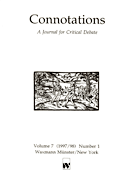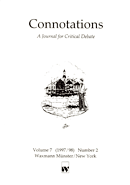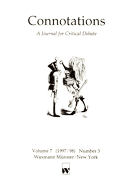Connotations Vol.7
(1997/98)
Articles in this issue
- What is the Dream in A Midsummer Night's Dream?
Robert Crosman, 7.1:1-17. - The Opening of All's Well That Ends Well
Richard Levin, 7.1:18-32. - Getting A Head In A Warrior Culture: Shakespeare's Macbeth and the Problem of Identity
Lynne M. Robertson, 7.1:33-43. - Of Mountains and Men: Vision and Memory in Wordsworth and Petrarch
Åke Bergvall, 7.1:44-57. - Science and the Re-representation of African Identity in Major Gentl and the Achimota Wars
Francis Ngaboh-Smart, 7.1:57-79. - Readers, Auditors, and Interpretation
Frances M. Malpezzi, 7.1:80-86. - Exonerating Lucius in Titus Andronicus: A Response to Anthony Brian Taylor
Maurice Hunt, 7.1:87-93. - "Lucius, the Severely Flawed Redeemer of Titus Andronicus": A Reply
Philip C. Kolin, 7.1:94-96. - Lucius, Still Severely Flawed: A Response to Jonathan Bate, Maurice Hunt, and Philip Kolin
Anthony Brian Taylor, 7.1:97-103. - Lisa Hopkins on John Ford's The Broken Heart: A Letter
Verna A. Foster and Stephen Foster, 7.1:104. - The Incorporation of Identities in Perkin Warbeck: A Response to Lisa Hopkins
Willy Maley, 7.1:105-15. - Modernism Revisited: Willi Erzgräber's Studies in Modern English and Anglo-Irish Literature
Bernfried Nugel, 7.1:116-27. - Some Comments on "T. H. White, Pacifism and Violence"
Elizabeth Brewer, 7.1:128-34. - More Than Just a Fashion: T. H. White's Use of Dress as a Means of Characterization
Christiane Berger, 7.1:135-40. - Editor's Preface
Inge Leimberg, 7.2:141-42. - Revisiting Halberstadt, July 1997
John Russell Brown, 7.2:143-45. - Colin Clout's Homecoming: The Imaginative Travels of Edmund Spenser
Donald Cheney, 7.2:146-58. - Old England, Nostalgia, and the "Warwickshire" of Shakespeare's Mind
Maurice Hunt, 7.2:159-80. - Wordsworth's "Tintern Abbey": From Self-Consciousness to Sympathy
Leona Toker, 7.2:181-93. - A Place Revisited: The House at The Jolly Corner
Ursula Brumm, 7.2:194-202. - The Harrowing of Malvolio: The Theological Background of Twelfth Night, Act 4, Scene 2
Paul Dean, 7.2:203-14. - All's Well That Ends Well: On Seeing and Hearing the Opening Scene
J. L. Styan, 7.2:215-18. - A Letter in Reply to Marvin Spevack, "The End of Editing Shakespeare"
Nicholas Kind, 7.2:219. - Deeper into the Bakhtinian Labyrinth: A Response to Rocco Coronato, "Carnival Vindicated to Himself?"
Yumiko Yamada, 7.2:220-39. - Carnivalizing Jonson: A Reply to Rocco Coronato
Bruce Boehrer, 7.2:240-45. - The Search for F. P. Greve/Grove: From First Doubts to a Greve Biography
Axel Knönagel, 7.2:246-53. - Dickens' A Christmas Carol: Revisiting and Reformation
Lothar Černý, 7.3:255-72. - The Sepulchral City Revisited: Joseph Conrad, Heart of Darkness
Manfred Beyer, 7.3:273-89. - Revisitings and Repetitions in Beckett's Later Works1)
John Brown Russell, 7.3:290-305. - Nightmare Visions of Eden: Recollections of Home in Joyce Carol Oates's "By the River"
Bernd Engler, 7.3:306-19. - Paradise Remembered in Some Poems and Paintings
John P. Hermann, 7.3:320-31. - Patterns of Recollections in Montaigne and Melville
William E. Engel, 7.3:332-354. - Shakespeare's "Removed Mysteries"
Chris Hassel, Jr., 7.3:355-67. - A "Grotesque" Reply to Y. Yamada and B. Boehrer
Rocco Coronato, 7.3:368-71. - Trading Meanings: The Breath of Music in Toni Morrison's Jazz
Nicholas F. Pici, 7.3:372-98. - Caryl Churchill's Top Girls and Timberlake Wertenbaker's Our Country's Good as Contributions to a Definition of Culture
Christiane Bimberg, 7.3:399-416. - Convicts, Characters, and Conventions of Acting in Timberlake Wertenbaker's Our Country's Good
Verna A. Foster, 7.3:417-32.


